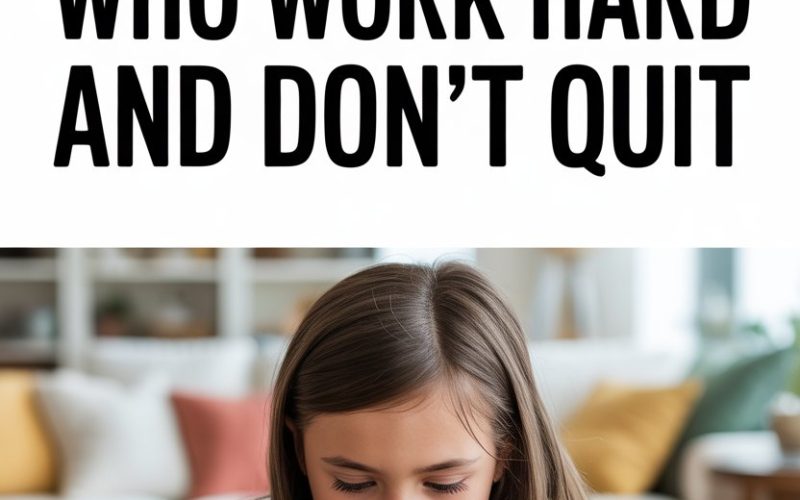If you’ve ever watched a toddler try to zip up their own coat for ten minutes (while you desperately need to get out the door), you know our kids aren’t born with an off‑switch for stubbornness.
The challenge for parents is channeling that persistence into something productive—helping kids become hard workers who keep going, even when the Wi‑Fi drops out or the biscuit tin runs dry.
Here’s how to raise kids who keep going, even when things get tough (and yes, even when everyone else is already at the park).
The Power of Your Example
Children are notorious little spies. They watch everything—how you react to burnt toast, how you slog through a work project, how you handle a flat tyre in the pouring rain.
Research from the University of Michigan confirms that children who see their parents put in effort and demonstrate resilience are more likely to mimic those behaviours themselves.
If you grumble your way through chores or toss your own hands up in frustration at the first sign of trouble, don’t expect your child to become the next Marie Curie.
But if you talk about mistakes as part of learning (“Well, that didn’t work. Let’s try again!”), your kids will start to see effort as something normal, not heroic.
You don’t need to be perfect, just real. Share your setbacks as well as your wins. Laugh about your own failed home improvement adventures. Show them that pushing through is simply part of being human.
Praising Effort Over Talent
It’s tempting to tell your child they’re so clever, especially when they ace a spelling test or build a Lego tower taller than their sibling’s sense of self‑importance.
But Carol Dweck’s research on growth mindset shows that praising effort (“You worked really hard on that!”) encourages kids to keep trying, even when things get tricky, rather than telling them they’re naturally gifted.
When you focus on how hard they tried, instead of how “smart” they are, kids learn that success comes from grit and persistence, not just being born with the right sort of brain.
A few swaps you can make tonight:
- Instead of “You’re so clever,” try “I can see you really stuck with it.”
- Replace “You’re amazing at this!” with “You must have practised a lot.”
- And, avoid “You’re a natural,” because who needs that kind of pressure?
Letting Kids Struggle a Little
As parents, we want to leap in and save the day (or at least the maths worksheet). A dropped puzzle piece or a tricky new skill can trigger an almost primal urge to fix it immediately.
But research out of Stanford suggests that letting children wrestle with challenges—without stepping in right away—actually builds resilience.
That means biting your tongue while your seven‑year‑old tries, fails, and tries again to knot a shoelace or set the table. Those little frustrations teach kids that feeling stuck doesn’t mean you’re finished.
It just means you haven’t figured it out…yet.
A good rule of thumb: Wait a beat longer than feels comfortable before offering help. You’ll be amazed at what they can do when given the chance.
Teaching Realistic Goal‑Setting
Dreams are brilliant. Every child should feel they can reach the moon (and, given the state of some bedrooms, they might actually be constructing a rocket under the bed).
But persistent kids also learn how to set goals that can be broken down into steps.
Sit down and help your child figure out a plan. If they want to learn guitar, brainstorm together: “What’s the first thing you need? How often do you want to practice?”
If they want to read 50 books this year, start by asking which one comes first.
Goal‑setting teaches kids that big things get done one small step at a time. And ticking off a goal? That’s its own reward—sometimes more motivating than the “well done” at the end.
Making Quitting Harder Than Finishing
Every parent has witnessed the “I’m bored, I quit!” routine. Sometimes, the trick is simply making it easier for kids to keep going than to stop. This doesn’t require military‑grade discipline (or a whistle), just a few tweaks.
- Break big tasks into smaller chunks. Cleaning a whole room can feel impossible. Tidying up three toys? Doable.
- Set timers and make “stick with it” a game. “Let’s see how much you can build before the song ends.”
- Use natural consequences. “If you stop building now, you won’t see how it turns out!”
The idea is to lower the barrier for sticking with things—and make quitting feel like missing out.
Creating a Home Where Effort is Valued
Home is where kids learn what matters most. If effort is celebrated—whether it’s running a race or folding all the socks (well, most of them)—kids realise that trying is worth something, even when results aren’t perfect.
Have family rituals that mark effort: a “Victory Dance” for finishing a tough project, a shout‑out at dinner for someone who didn’t give up, or a silly trophy for “Most Improved Sandwich Maker.” These are the things that stick.
Don’t forget to model failure, too. If you mess up the dinner recipe (again), shrug and say, “Well, I tried something new! Next time will be better.” Kids need to see that aiming high won’t always lead to perfection—and that’s perfectly fine.
Teaching Kids to Ask for Help the Right Way
Persistence doesn’t mean doing everything alone. Kids need to learn that it’s okay to ask for help, but not as a way to avoid effort.
Coach them to say, “I’ve tried this three times and I’m stuck,” instead of “I can’t do it.” This teaches self‑advocacy and the difference between responsible help‑seeking and giving up.
Parents can model this too: “I’m stumped by this IKEA shelf—anyone want to help me figure it out?” Watch how quickly kids pick up on the idea that asking for help is a sign of effort, not weakness.
Resilience Routines and Grit Rituals
Family routines make all the difference. If every setback is met with panic, kids learn to expect disaster. But if every tough spot is met with a calm, “Okay, what’s next?” they absorb that setbacks are temporary.
- Share “pit and peak” moments at dinner—what went wrong, and what you did next.
- Have a family motto (“We keep trying,” or “If at first you don’t succeed, laugh and get a biscuit”).
- Read books or watch films that show characters who work through failure (Roald Dahl’s Matilda is practically a masterclass).
When resilience is woven into daily life, kids start to see hard work and sticking with things as normal, rather than exceptional.
Celebrating Progress, Not Just Perfection
Everyone loves a gold star (or a sticker chart, or the all-important “high five”). But if rewards only show up at the finish line, kids may give up when the going gets slow.
Try celebrating progress at every stage. When your child is halfway through a big project, pause for a silly dance. When they stick with something for a whole week, mark it on the calendar.
Progress parties beat perfection parties every time. After all, who among us is perfect? (If it’s you, please send instructions.)
Keeping Perspective in the Age of Comparison
It’s hard for kids to work hard and persist when they think everyone else is zooming ahead. Social media, playground chatter, and even well‑meaning relatives can make your child feel like the only one who struggles.
Remind your kids (and yourself) that everyone moves at their own pace. Share stories from your own life about trying, failing, and sticking with it.
If your child loves cricket, talk about their favourite player’s years in the nets before making it big.
Comparison is the thief of joy—and persistence. Keep the focus on your child’s journey, and the rest will follow.
When Quitting is Actually Okay
Every now and then, sticking with something just isn’t right. If your child dreads ballet every week (and not just because of itchy tights), it might be time for a rethink.
Teach kids to distinguish between quitting because it’s hard versus quitting because it’s truly not for them. Open up a conversation: “What do you like? What don’t you like? Is there something else you’d rather try?”
Quitting isn’t failing when it’s thoughtful. It’s part of learning who you are—and what you’re willing to keep working for.
When Hard Work Turns the Corner
Raising kids who work hard and don’t quit isn’t about producing little robots who never stop. It’s about helping your children discover what lights them up, what’s worth effort, and how to keep going when things get tough.
Yes, you’ll have days when everyone wants to throw in the towel (possibly at 7:30 a.m.), but those little moments of persistence add up.
The next time you watch your child tie their own shoes—even if it takes eight tries—smile. That stubbornness is going to come in handy.
Now, if only they’d show the same dogged determination for emptying the dishwasher. One can dream.





